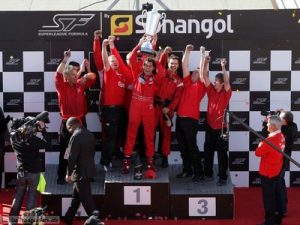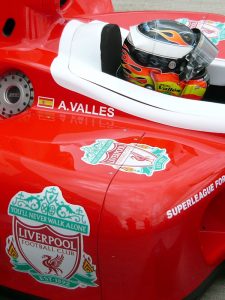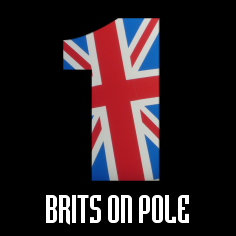What motivates a football club to diversify into backing a race team?
Superleague Formula put this question to Ian Ayre, the commercial director of Liverpool FC, in the wake of its affiliated team winning the 2009 championship with driver Adrian Valles.

And his answers could point to a shift in the thinking in the management of British sports clubs, as they seek ways to raise awareness, reach new markets and bring in new supporters for their core activities.
In Europe it’s a common phenomenon to see clubs compete across a wide range of disciplines.
The Sporting Club of Portugal (which you might know as Sporting Lisbon) competes in football’s Champions League but also promotes archery, athletics, billiards, boxing, chess, full-contact karate, gymnastics, handball, shooting, table tennis, taekwondo and weightlifting in addition to racing in Superleague Formula.
Similarly, Turkey’s Galatasaray, another Champions League football team associated with a Superleague car, fields teams in athletics, basketball, bridge, equestrianism, judo, rowing, sailing, swimming, volleyball, water polo and wheelchair basketball.
Another famous example is Barcelona, although this team has no presence in motorsport. In Britain it’s a lot less common to see sports clubs operate like this – although attempts were made in Newcastle in the 1990s when Sir John Hall, inspired by Barcelona, attempted to set up an umbrella club combining football, rugby, ice hockey and basketball.
So, adding an extra activity seems a very natural extension of their existing activities to many continental clubs, while to us in the UK it still seems quite unusual. Could the diversification of British football clubs point to new life for this trend in the UK?
The likelihood is that we have some way to go before we see clubs taking this direction. The key difference at the moment is that Superleague is a licensing arrangement rather than a core activity of the club in question.

The Liverpool FC car is run by British F3 and GP3 competitor Hitech Racing while the second-placed Tottenham Hotspur car is run by A1GP and British F3 outfit Alan Docking Racing and Delta Motorsport.
But with Premiership football teams increasingly run as businesses, it’s easy to imagine enthusiasm for the adoption of practices to build a club’s reach and brand if they can be proved to have worked elsewhere.
In that respect, Liverpool’s 2009 Superleague championship could be the key that unlocks an interest in diversification among other clubs.
Liverpool’s Ayres told his SLF interviewer: “It’s always important to have different commercial strands in a football club. We have grown our family of sponsors and we’ve improved our retail business – we now have four stores on Merseyside. Our online business is also growing, so in all those areas we’re doing well.
“Superleague is an example of how we’re doing with regards licensing, which is another area where Liverpool Football Club has value. People see that value and can create products of their own, and this has a financial reward for us. The combination of all these things is what will continue to increase our revenue and our position.”
Even though the focus at the moment is on licensing, it’s still very interesting to see sports management thinking outside the box when it comes to ways of extending their reach. How long before one of the major British teams decides there’s value in injecting the comparatively modest funding necessary to perk up its local ice hockey, basketball or speedway team?
Here’s the Q&A issued by Superleague in full:
SF: Another season and another title for Liverpool FC. What does it mean to have become Superleague Formula champions?
Ian Ayre: It’s important for this club to win things. Anything that represents us successfully as a football club is important. We’ve got a great team and a great driver and for the last two seasons we’ve been very successful in Superleague Formula. The pinnacle of that was winning the championship and winning it well. We had our Madrid supporters’ club there and for all these fans it was a great day. I was there alongside other members of our team and it’s great to see how the interest is building. About 30,000 people turned up, so it’s clearly growing as a sport and an event. We’re contracted to stay involved for several more years and it looks like an exciting proposition. They’re expanding where they race and are talking about places in the Middle East and Asia. These are areas where we’re very big as a football club so it’s a great synergy and a great fit.
SF: Tottenham were your closest rivals for much of the season. It must be satisfying to have beaten a fellow Premiership club?
IA: Their driver, Craig Dolby, was the only one who could have beaten us. He needed to win the second race last weekend and he was actually leading, but Adrian was able to get sufficiently up the rankings to win overall. It was a little bit like the Formula One championship in that Jenson Button didn’t win the race but clinched the series. The celebrations were unbelievable. It looked like Adrian had his entire village from Spain up on the podium with him. There was lots of champagne being sprayed about.
SF: Adrian visited Melwood and Anfield in the week leading up to Jarama. No problem with the language barrier?
IA: We’re all aware of the clear Spanish connection Liverpool Football Club has and having Adrian is great. He had a great day at Anfield the week before. The players keep in touch with him. I know Pepe Reina is a bit of a petrol head and has been in regular contact. Rafa also sent a great message of congratulations to him on the day. He’s fitted in really well and is clearly a rising star of motor racing.
SF: Why did the Superleague Formula concept appeal to Liverpool?
IA: There’s two things, for me. The first is us licensing our club logos and brand to Superleague. They have a similar arrangement with a lot of other teams. This is a financial opportunity for the club. The second thing, which is perhaps more important, is that it spreads the awareness of our football club. Superleague races in markets that perhaps we don’t go to very often as a football club. It attracts a different type of audience and means motor racing fans who perhaps aren’t big football supporters become attracted to Liverpool. By the same token, established Liverpool fans can see a bit of motor racing and have a good day out. It’s a family event with great access. They have a pit walk and you can walk along the grid as they are preparing for the race.
SF: Is this an example of the way the club is moving forward off the pitch?
IA: Commercially we are making great progress. It’s great to see things like this improving our financial position commercially. It’s always important to have different commercial strands in a football club. We have grown our family of sponsors and we’ve improved our retail business – we now have four stores on Merseyside. Our online business is also growing, so in all those areas we’re doing well. Superleague is an example of how we’re doing with regards licensing, which is another area where Liverpool Football Club has value. People see that value and can create products of their own, and this has a financial reward for us. The combination of all these things is what will continue to increase our revenue and our position.
